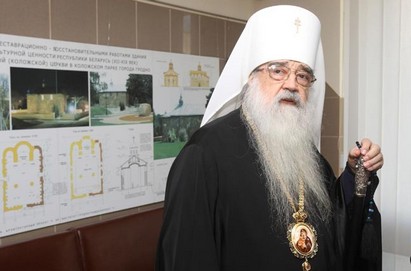Metropolitan Filaret: “We, Christians, cannot justify the death penalty”
-

- Metropolitan Filaret, Patriarchal Exarch of All Belarus
The Minsk-based House of Mercy hosted a round table discussion on the subject of “Religion and the Death Penalty,” organized by the Council of Europe in cooperation with the Belarusian government.
The round table was attended by representatives of the Orthodox and Roman Catholic Churches, legislative and judicial authorities of the Republic of Belarus, delegates of the Council of Europe, diplomats and human rights defenders.
Mikalai Samaseika, Chairman of the Standing Committee on International Affairs of the House of Representatives of the National Assembly of Belarus, and head of the parliamentary working group to study the death penalty issues, noted that in the issue of the death penalty “the truth is not in the rational and pragmatic, but in the moral aspect.” According to the MP, he personally is opposed to the death penalty.
Philippe Boillat, Director General of Human Rights and the Rule of Law of the Council of Europe, called the death penalty “an illusion of justice.” He stressed that the non-application of the death penalty is one of the necessary conditions for the accession to the Council of Europe. The sacredness of human life is one of the priorities of European values, said Mr. Boillat. He further stated that the death penalty “does not reduce the level of crime” and that the likelihood of a miscarriage of justice is high (according to the U.S. statistics, every 9th person executed in this country is innocent).
“More than two thirds of the countries have abolished the death penalty de jure or de facto,” reminded Head of the European Union Delegation to Belarus Maira Mora. According to her, the process of abolishing the death penalty in the European region was accompanied by active outreach work, when “people had to be persuaded.” “It is very gratifying to note the involvement of religious leaders in the roundtable discussion. Who can better explain the difference between revenge and redemption?” said the EU Ambassador.
The Ambassador of France to Belarus Michel Raineri said that “France is against the death penalty worldwide.” Commenting on executions in Belarus, Mr. Raineri said that “hatred should not control the decisions of public importance” and that “it is the Church who should come into play in this field.” Due to the fact that the debate on the death penalty in Belarus was worsened after the terrorist attack in Minsk subway in 2011, the diplomat said, “France is also attacked by terrorist. But despite this, we do not retreat from the principle of the inadmissibility of the death penalty.”
Patriarchal Exarch of All Belarus, Metropolitan Filaret welcomed the roundtable participants with a speech, read out by the press-secretary of the Minsk diocesan administration Archpriest Siarhei Lepin.
“The Belarusian Orthodox Church strongly drew public attention to the issue of the death penalty back in the 90’s. In 1996, ahead of the referendum, which, among other things, raised the issue of the death penalty, we called upon the people of Belarus to give up the punishment. “We, Christians, cannot justify the death penalty, for it is a sin of murder... The life of every human belongs to his Creator, our Lord. It was not us, sinful people, who gave life to Man, and it is not us who can deprive a person of life. Indeed, Lord Jesus Christ gave his life for the life of each of us, having endured suffering, humiliation, abuse, and death on the Cross... By executing its citizens, the State each time re-crucifies Christ. That was our position in the year of the referendum. To date it has remained unchanged,” emphasizes the Primate of the Orthodox Church of Belarus.
The round table was continued by meetings on the issue of the abolition of the death penalty and the prospects of the death penalty in the Republic of Belarus, as well as the social and legal aspects of the death penalty.

